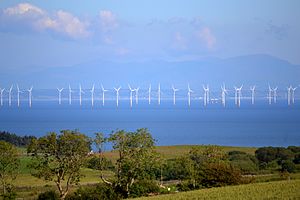This article needs to be updated. (February 2016) |
Robin Rigg Wind Farm, Scotland's first offshore wind farm, was constructed by E.ON at Robin Rigg in the Solway Firth, a sandbank midway between the Galloway and Cumbrian coasts. The wind farm first generated power for test purposes on 9 September 2009[1] and it was completed on 20 April 2010.
| Robin Rigg Offshore Wind Farm | |
|---|---|
 | |
 | |
| Country | Scotland |
| Location | Solway Firth, midway between the Galloway and Cumbrian coasts |
| Coordinates | 54°45′N 3°43′W / 54.75°N 3.72°W |
| Status | Operational |
| Commission date | April 2010 |
| Owner | E.ON |
| Wind farm | |
| Type | Offshore |
| Power generation | |
| Units operational | 58 X 3 MW |
| Make and model | Vestas: V90-3MW |
| Units decommissioned | 2 X 3 MW |
| Nameplate capacity | 174 MW |
| External links | |
| Commons | Related media on Commons |
Description
edit60 Vestas V90-3MW wind turbines were installed, with an offshore electrical substation.[2] Prysmian provided two 132 kV export cables each 12.5 km long to connect the wind farm to the on-shore substation.[3] Two units were subsequently decommissioned in 2015 due to failures during installation.[4] The 174 MW development provides enough electricity for around 117,000 households.[5]
The windfarm employs around 40 people, most of whom are local to the area. It is operated from the Port of Workington. Local suppliers are used whenever possible, providing services including vessel management, fabrication, environmental monitoring, catering, industrial cleaning, inspection services and printing.
In the first year of commercial operation the wind farm was available to operate for over 98% of the time. Its levelised cost has been estimated at £135/MWh.[6]
In March 2011 Robin Rigg became the first offshore wind farm to enter the OFTO regime with the two offshore and onshore export cables and the onshore 132kV substation being bought by Transmission Capital and Amber Infrastructure.
Legal case
editThe wind farm was the subject of a legal case decided by the UK Supreme Court in 2017, which arose because certain of the foundation structures failed shortly after completion of the project. These had been designed and installed by Danish company MT Højgaard A/S under a contract awarded by E.ON.[7] The case was legally significant because a requirement that the structures "be designed with a lifetime of 20 years" was contained within a Technical Requirements document which formed part of the contract, but on appeal Jackson LJ considered this requirement "too slender a thread" upon which to hang MT Hojgaard's liability in the light of other, inconsistent, parts of the specification, and because E.ON had specified a requirement that they comply with offshore standard J101, an international standard for the design of offshore wind turbine structures produced by the technical standards company DNV.[8] The J101 standard contained a calculation error; although MT Hojgaard aimed to comply with the standard as-published, their design was not sufficiently robust to meet the 20-year lifetime requirement and so the Supreme Court found they had breached the contract.[9]
See also
editReferences
edit- ^ "BBC NEWS - UK - Scotland - South of Scotland - Offshore turbines start turning". bbc.co.uk. Archived from the original on 20 February 2022. Retrieved 9 September 2009.
- ^ OWE, Ger de Groot. "offshorewindenergy.org". Archived from the original on 11 February 2012.
- ^ "Phase II - Construction" (PDF). e-on UK. Archived (PDF) from the original on 14 October 2017. Retrieved 20 February 2022.
- ^ "MPI ADVENTURE Decommissioning Robin Rigg Turbines". 4C Offshore. 9 October 2015. Archived from the original on 5 October 2016. Retrieved 27 October 2015.
- ^ "Robin Rigg Offshore Wind Farm Project" (PDF). Archived from the original (PDF) on 16 October 2007.
- ^ Aldersey-Williams, John; Broadbent, Ian; Strachan, Peter (2019). "Better estimates of LCOE from audited accounts – A new methodology with examples from United Kingdom offshore wind and CCGT". Energy Policy. 128: 25–35. doi:10.1016/j.enpol.2018.12.044. hdl:10059/3298.
- ^ United Kingdom Supreme Court, MT Hojgaard AS v E.ON Climate and Renewables UK Robin Rigg East Ltd & Anor (2017) UKSC 59, judgment delivered 3 August 2017, accessed 11 October 2022
- ^ DNV, Offshore Standard DNV-OS-J101: DESIGN OF OFFSHORE WIND TURBINE STRUCTURES, JUNE 2004, accessed 25 November 2022
- ^ Albou, E., On Shaky Ground: Contractual Law & the Robin Rigg Case, Lawyer Monthly, published 16 October 2017, accessed 25 November 2022
